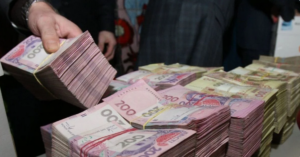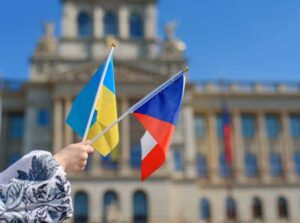
The number of citizens who declared income exceeding one million hryvnia in 2024 increased by 6,600 to 17,000, which is 63.4% higher than in 2023 (10,400), according to Ruslan Kravchenko, head of the State Tax Service of Ukraine.
“In total, more than 17,000 people declared income exceeding one million hryvnia. Overall, millionaires declared income totaling 253.6 billion hryvnia, with 8.7 billion hryvnia in tax liabilities determined for payment. One Kyiv resident declared a record amount of personal income tax and military tax liabilities to be paid to the budget—more than 4.6 billion hryvnia,” he wrote on Telegram on Monday.
Kravchenko added that more than 53,000 citizens exercised their right to a tax rebate and will receive UAH 330 million from the budget. Compared to the same period last year, this is UAH 36 million more.
In total, in 2024, Ukrainians filed 170,000 tax returns and declared UAH 326 billion, which is UAH 107 billion more than in 2023. Based on the tax returns, citizens independently determined that they owed 8.1 billion hryvnia in personal income tax (PIT) and more than 1.5 billion hryvnia in military tax (MT). In regional terms, the largest amounts were declared by residents of Kyiv (UAH 156 billion), Dnipropetrovsk (almost UAH 30 billion), Lviv (UAH 18.2 billion), and Kyiv region (UAH 17.5 billion).
The largest amounts of income declared by citizens last year were income from abroad – UAH 34.2 billion, inheritance and gifts – UAH 13.6 billion, income from the sale of movable and immovable property – UAH 6.8 billion, investment income – UAH 4.9 billion, other taxable income – UAH 4 billion, and income from renting property – UAH 3.4 billion.
“The current tax return campaign has shown an increase in citizens’ tax awareness and their understanding of paying taxes as a social necessity. Thank you to everyone who honestly declared their income,” summarized the head of the State Tax Service.

The Czech Republic has employed 160,000 Ukrainian refugees, according to Czech Prime Minister Petr Fiala.
“The Czech Republic is the country that has accepted the most Ukrainian refugees per capita… Our decision has been successful, and we as a society have managed to overcome obstacles and further integrate refugees. Currently, 160,000 are working in our labor market,” Fiala said at a joint press conference with Ukrainian President Volodymyr Zelensky in Prague on Monday.
According to him, proposals on the future of Ukrainian refugees “will depend on how the current situation develops.” At the same time, Fiala reminded that the current refugee protection program in the EU is valid until March 2026 and this deadline must be kept in mind.
According to updated UNHCR data, the number of Ukrainian refugees in Europe as of February 19, 2025, was estimated at 6.346 million, and worldwide at 6.907 million, which is 43,000 more than on January 16.
According to Eurostat, Germany remains by far the country with the largest number of refugees from Ukraine in the EU and the world, with 1,161,450 at the end of 2024, or 27.3% of the total number of beneficiaries in the EU. The top three also include Poland with 991,630, or 23.3%, and the Czech Republic with 388,630, or 9.1%.

June 4, 2025 | Parkovy Exhibition Center, Kyiv
The IV Ukrainian Construction Congress is back — bigger, more ambitious, and more relevant than ever. This event, which has already become a landmark for the entire market, will bring together over 6,000 participants, 350 experts, 60 partner stands, and will host 30+ discussions that will determine the direction of the development business and the architectural industry in Ukraine.
This year, the Congress is being held under the slogan “WE MUST BE THE CHANGE.” In the context of the country’s recovery, developers, architects, investors, officials, and experts will come together to speak candidly about the challenges, breakthroughs, markets, politics, values, and meaning of new Ukrainian urbanism.
The event is organized by DMNTR Media Group, a team that has been creating large-scale business events for 25 years, bringing together leaders in the construction business, government officials, investors, and public figures to discuss strategic directions for the development of Ukraine’s construction industry.
This year, a number of key discussions and presentations have been added to the main topics, which have already been published on the website:
All topics are not just words, but practical vectors of change. We don’t discuss — we design a new reality.
The IV Ukrainian Construction Congress will feature leading figures from the real estate, architecture, development, and urban planning markets. Their ideas, experience, and projects are shaping the context for Ukraine’s recovery. Among the invited speakers are:
Igor Guda — founder of Kreator-Bud; Oleksiy Baranov — founder of A Development; Artur Mkhitaryan — founder and CEO of the development company Taryan Group; Roman Davymuka — CEO of Avalon; Igor Nikonov — founder of KAN Development; Rostislav Melnyk, CEO of RIEL Real Estate Corporation; Andriy Vavrysh, founder of SAGA Development; Vasyl Bumburas, CEO of construction company Gefest; Valeriy Kodetskyi, president of City One Development; Dmytro Kovalchuk, owner and CEO of Alterra Group, developer of Formatsia. Lviv; Anna Laevska — Commercial Director of Intergal-Bud; Boris Goldenstein — Founder and CEO of ZEZMAN HOLDING; Mark Marchenko — Founder and CEO of SENSAR Development; Igor Ilchishen — Founder of the development and investment company Aha Group; Oleksandr Seleznyov — founder of investment company MIND CAPITAL PRO; Serhiy Odarych — founder of ODA DEVELOPMENT; Ivan Molchanov — CEO of Stolitsa Group, DIM9000; Anna Popruga — head of marketing at KAN Development; Oleksandr Novytskyi — head of the State Architectural and Urban Planning Inspection of Ukraine; Yevgeny Favorov — Chairman of the Ukrainian Association of Developers; Igor Lisky — Chairman of the Supervisory Board of EFI Group; Arseniy Nasykovsky — Junior Partner at DIM Group; Maksim Odintsov — Business Developer Manager at the construction company Dva Akademika; Mark Kestelbaum — CEO of WELL-BE! NG, CONTECH, BUDOVA; Pavlo Somov — developer, founder of the Edem Building Group; Valery Kirilko — owner and CEO of Industrial Parks of Ukraine; Igor Didyk — co-founder of Dzen Residence and AI Development; Andriy Babula — co-founder of Dzen Residence and AI Development; Gleb Kuznetsov, owner and CEO of APGRADE; Yevgen Amirov, CEO of the PHOENIX group of companies; Oleksiy Voloshin, CEO of the management company Edem Family, and many others.
This year, we are honored to welcome world-renowned urbanist Hiroki Matsuura, architect and urban planner, founder of MADMA urbanism+landscape (Japan/Netherlands). His presence is a unique opportunity for professionals to learn firsthand about global trends, new urban visions, and European integration in urban planning.
The highlight of the event will be the award ceremony for the winners of the II All-Ukrainian competition for architects, builders, and developers “Creator of the Year 2025.”
The competition includes over 600 submitted projects, 60 stands, 250 speakers, and an audience of 6,000 guests.
Key dates:
All details and application submission: www.ubc-ua.info/конкурс-творець-року
As part of the IV Ukrainian Construction Congress, a series of partner sessions will be held by key expert organizations, each of which is a separate professional platform with a unique focus. This is a chance to deepen the dialogue, discuss specialized topics, and bring together professional communities.
– Mayors’ Club — A nationwide public organization that brings together current and former city leaders in Ukraine. They will talk about:
– Ukrainian Cluster Alliance – This is an association of hundreds of clusters from all over Ukraine that are creating a new economy. The topic of their panel discussion:
– Kyiv School of Development – An educational platform for development professionals.
– UkrInvestClub – A platform for investors and startups that promotes investment in Ukrainian projects. They will discuss the topic:
– Board International Business Community – A community for entrepreneurs and C-level executives.
– Union of Real Estate Professionals of Ukraine – The main voice of the market of realtors, consultants, and development analysts.
– Kolayder Educational Space – An innovative platform that combines education, urbanism, and entrepreneurship. They will share their thoughts on the topic:
“Congress in Congress” is a new level of interaction between professional communities that complements the central program and creates depth, breadth, and a human face for the future of construction in Ukraine.
This will allow us to focus on specific issues, increase the practical value of discussions, and expand the audience of speakers and guests.
Location: Parkovy Exhibition Center, Kyiv (3rd floor)
Time: 09:00–21:00
Format: Live event
Organizer: DMNTR media group, with 25 years of experience in hosting top business events in Ukraine.
Organizer contacts: +380444619128
Registration: www.ubc-ua.info
UBC 2025 is not just an event. It is a place where a new Ukraine is being built. Join us in creating the future together!
Interfax-Ukraine — information partner

Based on the latest data from the US Geological Survey (USGS) and the International Lead and Zinc Study Group (ILZSG), the analytical center “Experts Club” has presented an updated ranking of the world’s twenty largest zinc producers for 2024.
Top 20 countries by zinc production in 2024
Rank Country Production volume (tons)
1 China 4,000,000
2 Peru 1,300,000
3 Australia 1,100,000
4 India 860,000
5 United States 750,000
6 Mexico 700,000
7 Bolivia 510,000
8 Kazakhstan 370,000
9 Russia 310,000
10 Sweden 240,000
11 South Africa 120,000
12 Canada 110,000
13 Brazil 100,000
14 Iran 90,000
15 Portugal 80,000
16 Ireland 70,000
17 Namibia 60,000
18 Finland 50,000
19 Turkey 40,000
20 Spain 30,000
Current trends and challenges
The global zinc market faces a number of challenges:
Source: https://expertsclub.eu/top-20-stran-po-dob%d1%8bche-czynka-v-2024-godu/

The Experts Club think tank has analyzed the state of the French economy and provided its forecasts for the whole of 2025. At the beginning of 2025, the French economy is showing signs of slowing down due to internal and external factors, including the escalation of trade disputes with the United States.
Current economic indicators
According to the National Institute of Statistics and Economic Studies (INSEE), France’s GDP grew by 0.1% in the first quarter of 2025 compared to the previous quarter, following a 0.1% decline in the fourth quarter of 2024. This modest growth was mainly driven by inventory accumulation in the chemical, pharmaceutical, and agro-industrial sectors, which added 0.5 percentage points to GDP. However, domestic demand remains weak, with consumer spending stagnating and business investment declining by 0.1%. Foreign trade also had a negative impact, reducing growth by 0.4 percentage points due to a 0.7% decline in exports and a 0.4% increase in imports.
Impact of US trade tariffs
The introduction of new tariffs by the administration of US President Donald Trump, including a 25% duty on cars, steel, and aluminum, is putting significant pressure on France’s export-oriented industries. Companies such as Airbus are looking for ways to circumvent these tariffs, for example by delivering aircraft to US airlines via third countries.
The French government has lowered its economic growth forecast for 2025 from 0.9% to 0.7%, citing uncertainty in global trade. The Bank of France has also confirmed this forecast, noting that growth remains positive but is slowing compared to previous years.
Forecast for the end of 2025
Economists expect France’s economic growth to remain weak in the second half of 2025, with a possible improvement in 2026. The main risk factors remain ongoing trade disputes with the US and domestic political uncertainties. However, France is committed to maintaining economic stability through fiscal measures and stimulating domestic demand.

The development company Alliance Novobud has already signed 100 agreements under the state program of preferential mortgages ‘єОселя,’ according to the company’s press service.
“The “єОселя” program plays an extremely important role both for the primary real estate market and for the socio-political situation in the country. It helps thousands of Ukrainians — primarily those who defend the state or were forced to leave their homes — to purchase their own homes on preferential terms. Already 100 families have become owners of apartments in our residential complexes thanks to this program, and most of them are military personnel and Ukrainians with IDP status. Demand for the program is growing every day, so we are convinced that it should be developed and supported in the future,” commented Irina Mikhaleva, CMO of Alliance Novobud.
The largest number of agreements – 48 – were concluded with the participation of partner bank Skybank. The rest of the agreements were concluded with six other financial institutions (Oschadbank, Ukrgasbank, Privatbank, Sens Bank, Ukreximbank, and Radabank).
The most popular property among participants in “єОселі” was house No. 3 in the Krona Park II residential complex, where 13 agreements were signed. A total of 16 properties from the developer are participating in the program.
Two-room apartments are in the highest demand, with 45 already sold. One-room apartments are the second most popular. The average size of an apartment purchased under the program is 71 square meters.
Deals with preferential rates of 3% and 7% were distributed almost equally. At the same time, buyers prefer ready-to-move-in homes, although apartments in new buildings under construction also have a high share of sales — the difference in demand is only a few percent.
According to data from the LUN new construction portal, Alliance Novobud was founded in 2006. Since 2010, the company has commissioned 37 buildings and parking lots, and is in the process of completing nine buildings in the Krona Park II residential complex in Brovary and a premium-class project in the capital, Montreal House.
alliance novobud, agreements, єоселя